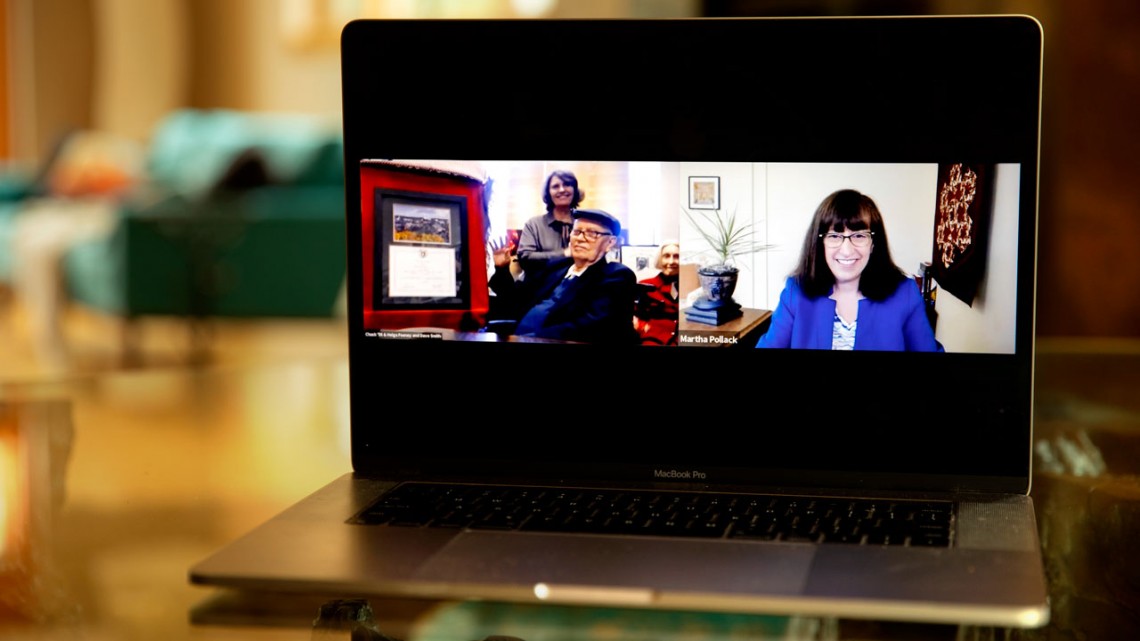Feeney ’56 honored for ‘transformative’ contributions to Cornell
Resource type: News
Cornell Chronicle | [ View Original Source (opens in new window) ]

By Kathy Hovis
Charles F. “Chuck” Feeney ’56, founding chairman of The Atlantic Philanthropies and Cornell’s most generous donor, was honored with the inaugural Charles F. Feeney ’56 Lifetime Achievement Award for Entrepreneurship and Humanity on April 30 during Entrepreneurship at Cornell’s annual Celebration conference.
President Martha E. Pollack presented Feeney with the award, created to honor successful entrepreneurs dedicated to giving back. Through the Atlantic Philanthropies, Feeney anonymously gave away nearly all of his $8 billion fortune over the years, including nearly $1 billion to Cornell.
“Today, we at Cornell are getting the chance to do something we’ve wanted to do for a very long time,” Pollack said, “which is to say an enormous public thank you to Chuck, who has played such a singular role in the history of Cornell.”
Feeney’s generosity to the university included a transformative gift to help establish Cornell Tech; the creation of the Cornell Tradition program; and decades of giving to university infrastructure, academic programs, student life and scholarships. Pollack cited Cornell’s ninth president, the late Frank H. T. Rhodes, who referred to Feeney as “Cornell’s third founder, after Ezra Cornell and Andrew Dickson White.”
Cornell also recently celebrated Feeney with the renaming of East Avenue as Feeney Way, honoring, as Pollack put it, “both Chuck, and the legendary Feeney Way: that way of being that guided so much generosity, and so much good work here at Cornell.”
During the April 30 event, Feeney’s friend Dave Smith read remarks from Feeney, saying that Feeney felt fortunate to have learned to value both entrepreneurship and humanity, at home and at Cornell. “My cup runneth over,” Smith read.
After the presentation, Pollack held a conversation with Christopher G. Oechsli, who served The Atlantic Philanthropies for 17 years and was chairman and CEO at the time of the foundation’s close in 2020.
Oechsli said Feeney embodied an entrepreneurial spirit from a young age.
“He was known for trying to make a buck doing the right thing,” Oechsli said, “whether that was shoveling snow, selling Christmas cards or setting up umbrellas for people on the beach.”
A native of Elizabeth, New Jersey, Feeney enrolled in the School of Hotel Administration in 1952 with support from the GI Bill. At Cornell, Feeney was known as the sandwich man, making sandwiches from cold cuts or peanut butter and jelly and selling them to fellow students.
In 1960, he and fellow hotelie Robert W. Miller ’55 co-founded Duty Free Shoppers, which soon became the largest seller of luxury goods in the world.
“Moving through various cultures, Chuck was a keen observer of people and their needs,” Oechsli said. “His travels and military service opened his eyes to the great needs that exist.”
Entrepreneurship at Cornell’s two-day Celebration event also included a Friday chat with Robert Langer ’70, co-founder and a member of the board of directors of Moderna and Institute Professor at the Massachusetts Institute of Technology. The chat was moderated by Lynden Archer, the Joseph Silbert Dean of Engineering.
Archer asked Langer to expand on the advice he gives to students as they graduate – to “do something big that can change the world.” Langer said that after finishing his graduate work at MIT, he was offered 20 jobs, mostly with oil companies, but decided instead to “do something with my chemical engineering degree that would help people, with respect to their health or education.”
He sent letters to 40 hospitals and medical schools, finally securing a job with Children’s Hospital in Boston. As the only engineer there, he started brainstorming ideas to solve some of the doctors’ problems related to drug delivery, materials, tissues and organs.
Langer would go on to hold more than 1,400 granted or pending patents, and participate in the founding of more than 40 biotechnology companies.
“Entrepreneurship is actually the crucial glue between a good idea and one that can change the world,” Langer said, adding that by starting a number of smaller companies, “I could see that these companies could make such a difference. I just kept doing that and it’s led to products that are used all over the world.”
Some of Langer’s early companies did important work on drug delivery nano- and microparticles, particles that would become foundational to the messenger RNA technology behind some present-day COVID-19 vaccines. In his present role at Moderna, Langer was deeply involved in the company’s science, including its COVID-19 vaccine development.
“We had a prototype in a couple of weeks and were able to start clinical trials in two months,” he said. “Everyone there was working 24/7.”
Langer said he’s proud that he’s been able to do important work “but there are still so many problems – so many people in the developing world not getting good-enough nutrition, medicine and vaccines.”
Other Celebration highlights included final presentations for the Student Business of the Year competition, which was won by Julia Isakov ’21, founder of Vita Innovations; and eLab Demo Day, where students from the eLab Student Business Accelerator showcased their businesses and responded to questions.
Kathy Hovis is a writer for Entrepreneurship at Cornell.